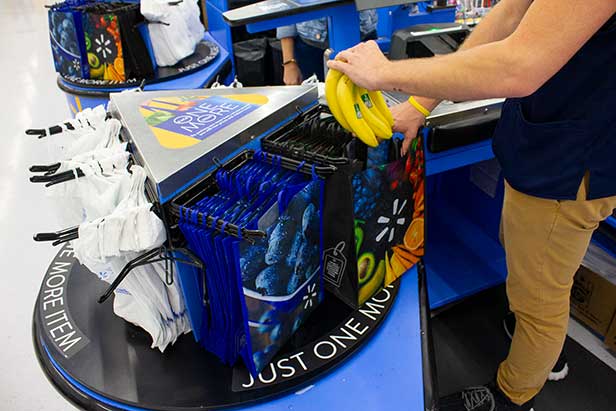April 11, 2019
Walmart To Offer Reusable Bags At Checkout
The move could have a positive knock-on effect for the promo industry.
Walmart, the world’s largest retailer, is going to start offering reusable bags for purchase at checkout registers in its U.S. stores. The move, which comes amid a growing movement to reduce or eliminate single-use plastic bag usage, could potentially prove beneficial to the promotional products industry.

Photo from Walmart
On Wednesday, Walmart announced that the reusable bag initiative will hit stores in May. Aimed at reducing plastic waste, the bags are part of a broader campaign Walmart is undertaking to get greener, which includes working to make its private brand packaging 100% recyclable, reusable or industrially compostable by 2025. The bags will cost 98 cents, and will be made of post-consumer recycled content. [It wasn’t clear if there was any connection between the initiative and WalmartPromoshop.com, a web-based promo products retailer branded to Walmart that’s run by Texas-based distributor Harland Clarke (asi/219943).
Lee Scott, our former CEO, said, “There is virtually no distinction between being a responsible citizen and a successful business. They are one and the same for @Walmart.” We have some lofty goals, but we’re confident we can achieve them. https://t.co/YfCE1B1HbM
— Dan Bartlett (@danbartlett6) April 10, 2019
Walmart joins an expanding list of big-name brands taking public steps to combat waste generated by single-use plastic products. Supermarket chain Kroger, for instance, plans to eliminate single-use plastic bags from stores by 2025. Come next year, plastic straws will no longer be available at Starbucks cafés, the company has said. Still, it’s Walmart’s move that could potentially trigger expanded opportunity for the promotional products industry.
There’s no bigger name than Walmart. When a retailer with that kind of trend-setting power takes a step like this, it can influence others of all sizes to consider similar action. Promo distributors could capitalize, stepping in to sell stores and other businesses branded reusable bags. Ad specialty pros can even leverage the Walmart example with prospects that are unaware of it, using the initiative to illustrate why now is an excellent time to invest in reusable totes and the like.
Momentum toward banning single-use plastic products has been accelerating. New York recently became the second state behind California to approve a ban on single-use plastic bags. The ban is scheduled to go into effect come March 2020.
Meanwhile, at least 91 bills have been introduced in the U.S. this year regarding plastic bags, mostly to ban or place a fee on them, according to the National Conference of State Legislatures. In addition to California, the cities of Boston, Chicago and Seattle are among those that have already enacted bans of single-use bags. Hawaii effectively has a statewide ban because of county-level regulations throughout the island state. Washington, Oregon, New York and New Jersey are among the other states considering state-level action to clampdown on single-use plastic bags.
The plastic ban movement has gone international, too. Recently, the European Parliament, the legislature governing the 28 EU nations, voted overwhelmingly to institute a prohibition on plastics, effective 2021. Even several churches across the U.S. and abroad have joined the movement, encouraging parishioners to give up plastic for Lent.
Prohibitions on plastic bags pose potential opportunity for promotional products firms, as companies look to reusable bags to serve their customers.
Ban advocates say permanently shelving single-use plastic products will help protect the environment and wildlife, especially marine animals. Still, there has been pushback, with some states passing or considering legislation that would bar municipalities and counties from enacting plastic bag bans. Concerns include that outlawing plastic bags could place financial strain on low income families and individuals, kill manufacturing jobs in the plastic-making industry, and cause major compliance headaches for stores/chains that have to contend with regulations that vary in the different locales where they operate.

Product Hub
Find the latest in quality products, must-know trends and fresh ideas for upcoming end-buyer campaigns.
